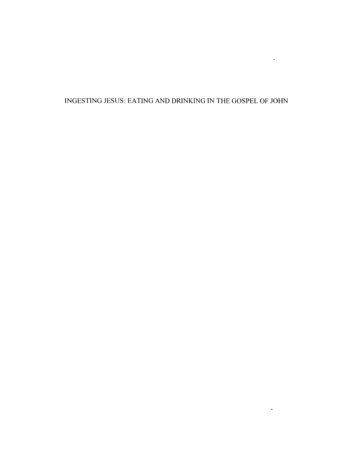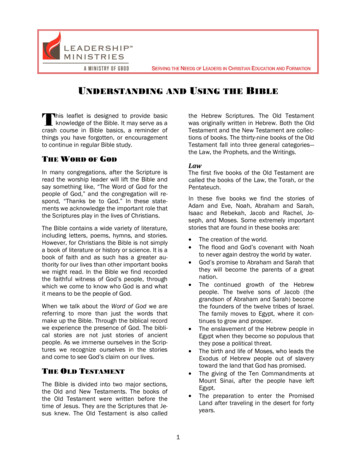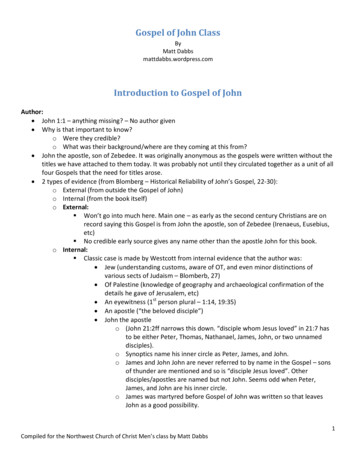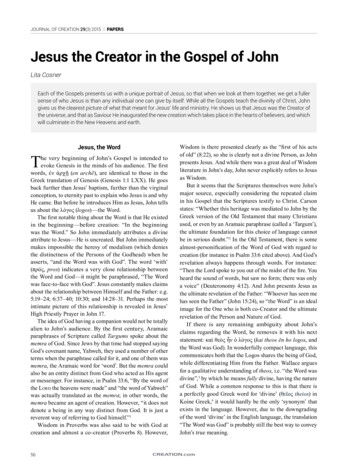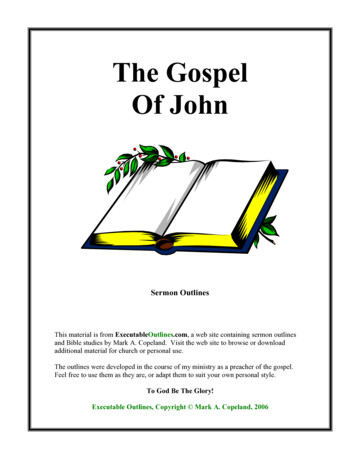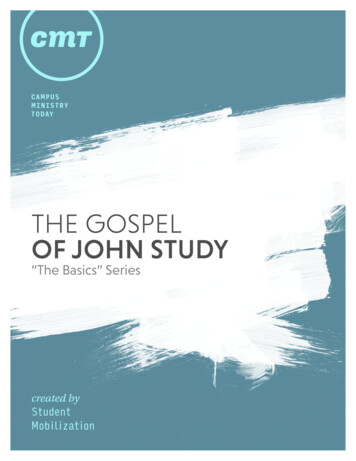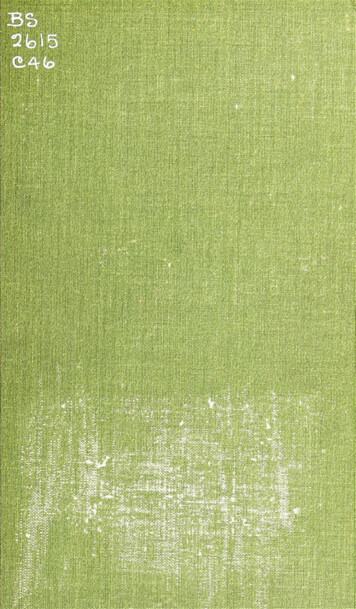
Transcription
iitSSἘΣΞΈΡΕcose
CORNELLUNIVERSITYLIBRARYAlfredC,Barnes
CornellBS2615 .C46UniversityἽΝLibraχii”342 544
Cornell UniversityLibraryThe original of this book is inthe Cornell University Library.There are no known copyright restrictions inthe United States on the use of the 544
JOHN THE PRESBYTERAND THE FOURTH NDONIQII7,PRESS
B.1867)HENRYPUBLISHERLONDON,FROWDE,TO THEEDINBURGH,TORONTOM.A.UNIVERSITYANDNEWOF OXFORDYORKMELBOURNE
PREFACEIt is well to explain that the following argumentswerewrittendownin 1903 or 1904, asthe situation has somewhat changed since then.Dr. Sanday referred to my MS., which he hadbeen so kind as to read, in his book, The Criticismof the Fourth Gospel (1905), p. 252. Since thenI have rewritten some passages towards the end,for the sake of clearness, and I have added references to subsequent writers. But the wholematter seems to me just as clear as it didwhen.I first wrote it.Joun CuHapman, O.S.B.ERDINGTON ABBEY,BIRMINGHAM.July, 1910.CuMNIHILPERMISSUSUPERIORUMORDINIS.OBSTAT.J. MeIntryre,Censor DeEputatTus.IMPRIMATUR.%* EpuarpusEptsA2BirMINGHAMIENSIS.
CONTENTSPAGE§ 1. The difficulties in the fragment of the Prologue of Papias7§ 2. The two interpretations of τοὺς τῶν πρεσβυτέρων λόγους, τί Ανδρέας εἶπεν, etc. .§ 3. St. IrenaeusunderstandsthePresbyterstobenotApostles, but disciples of the Apostles§ 4. Eusebius understands the Presbyters to be not Apostles,but disciples of the Apostles§ 5. Aristion and John were disciples of the Lord .§ 6. Papias knew John the Presbyter and Aristion personally28§ 7. Eusebius on John the Presbyter§ 8. St. Irenaeus on John the Presbyter .§ 9. Early witnesses to the identity of the Presbyter and the- Apostle .§ 10. Apostle, Disciple, Presbyterδ 11. Philip the Apostle at Hierapolis.§ 12. Consequences of assuming the separate existence of Johnthe PresbyterΣ:§ 13. The witness of John the Presbyter to his own identity.84Additional note on De Boor’s fragment of Philip of SideINDEX103
δ 1The difficulties in the fragment of the Prologueof Papas.Ir is a sign of the times that Professor Mommsen,shortly before his death, should have written, withregard to the great question of the origin of the fourthGospel: ‘ Der Sitz der Johannes-Controverse ist Eusebius’ Bericht tiber den Papias, Hest. Eccl. iii. 39.1 Therewas a time when scholars in Germany thought only of internal evidence ; now every scrap of external evidence isweighed and employed, and the results are more hopefuland less bewilderingly diverse. It is possible now for‘Conservative and Liberal, Catholic and Rationalist, toassist one another, and to work together for the dis-covery of truth; and though each of us is prejudicedin his own fashion, the honest attempt to judge in a drylight is commoner than it once was,’ and we learn muchfrom those who approach the same evidence from aslightly different point of view.The words of Papias referred to by Mommsen arecertainly of immense importance. They have beeninterpreted in various ways, and have been subjected tomany conjectural emendations. One at least of theinnumerable commentaries upon them, that of Dr. Zahn,1 Zeitschrift fir N.-T. Wiss. 1902, 2, p. 156.* I am not sure that this is so true in 1910 as I thought it in1903-4.
8JOHNTHEPRESBYTERδιis of wonderful elaboration. Many are of great ingenuity.But it cannot be said that the question is yet settled.I do not despair, however, of reaching a definite andconvincing conclusion with regard to the real meaningof Papias. In the following pages I shall examine theavailable evidence with all possible care, and I shall beobliged to disagree with theologians on both sides ofthe Johannine question, and to agree in part with thosewhose final results I reject.I subjoin the words of Papias cited by Eusebius :Οὐκ ὀκνήσω δέ σοι, καὶ ὅσα ποτὲ παρὰ τῶν πρεσβυτέρωνκαλῶς ἔμαθον καὶ καλῶς ἐμνημόνευσα, συγκατατάξαι ταῖςἑρμηνείαις, διαβεβαιούμενος ὑπὲρ αὐτῶν ἀλήθειαν.Ovyap τοῖς τὰ πολλὰ λέγουσιν ἔχαιρον ὥσπερ οἱ πολλοί, ἀλλὰτοῖς τἀληθῆ διδάσκουσιν, οὐδὲ τοῖς τὰς ἀλλοτρίας ἐντολὰςμνημονεύουσιν, ἀλλὰ τοῖς τὰς παρὰ τοῦ Κυρίου τῇ πίστειδεδομένας καὶ ἀπ αὐτῆς παραγινομένας τῆς ἀληθείας.Εἰδέ που καὶ παρηκολουθηκώς τις. τοῖς πρεσβυτέροις ἔλθοι,τοὺς τῶν πρεσβυτέρων ἀνέκρινον λόγους, τί Ἀνδρέας ἢ τί a 44aε* xΠέτρος εἶπεν, ἢ τί Φίλιππος, ἢ τί Θωμᾶς ἢ ’IéxwBos, ἢ τί Ιωάννης ἢ Ματθαῖος ἤ τις ἕτερος τῶν τοῦ Κυρίου μαθητῶν,ἅ τε ἀριστίων καὶ ὁ πρεσβύτερος Ιωάννης, τοῦ Κυρίουμαθηταΐ, λέγουσιν. Οὐ γὰρ τὰ ἐκ τῶν βιβλίων τοσοῦτόν μεὠφελεῖν ὑπελάμβανον, ὅσον τὰ παρὰ ζώσης φωνῆς καὶla Δ, Δpevotons.—Eus, H. . iii. 30.? AITZx
§2The two interpretations of τοὺς τῶν πρεσβυτέρωνλόγους, τί ‘Avdpéas εἶπεν, etc.Who were the Presbyters ἢ Undoubtedly the simplestway to translate τοὺς τῶν πρεσβυτέρων ἀνέκρινον λόγους,τί Ἀνδρέας ἢ τί Πέτρος εἶπεν is this: ‘I inquired thewords of the Presbyters, that is to say, what Andrew orPeter said,’ &c., thus identifying the Apostles enumerated with the Presbyters whose words are asked for.At first sight this even appears to be the only possiblemeaning, and Dr. Abbott, who does not accept thisinterpretation, admits that the form of words is ‘almostirresistible evidence’in its favourIt has recentlybeen urged with great force by M. Michiels, by Dr. Zahn,and by Dr. Bardenhewer.?It results in making the1 Expositor, 1895, pp. 336-7.2 Michiels, L’Origine de l'Episcopat, Louvain, 1900, pp. 301-5;Zahn, Forschungen, vi, pp. 122, 134 foll.; Bardenhewer, Gesch. deraltkirchl. Litt., pp. 538-9; and now by Lepin, L’ Origine du 4 Evangile (1907), p. 136, an author with whom I am sorry to disagree, onaccount of the great admiration I have for his book.Funk speakswith equal decision in his note on the passage, Patres Apostol.(1901), i. 352; and Batiffol has-followedFunk (L’Eglise naissante,3rd ed., 1909, p. 205, note). Similarly Gutjahr, Die Glaubwiirdigkeit des Irendischen Zeugnisses (Graz, 1904, pp. 77 foll.). Butthe greatest authority is Lightfoot, Essays on Supernatural Religion(1889), p. 145: ‘What classes of persons he intends to includeunder the designation of “elders” he makes clear by the nameswhich follow. The category would include not only Apostles likeAndrew and Peter, but also other personal disciples of Christ, suchas Aristion and the second John.In other words, the term with
10JOHNTHEPRESBYTER§2epithet ‘Presbyter’ identify the second John with theformer, instead of distinguishing the two.It has a stillmore remarkable reaction upon Papias’s first sentence,in which he declares himself the direct disciple of thePresbyters, for he appears in consequence as the discipleof a good many Apostles. This is the more interesting,as nowhere else is he called the disciple of more thanone, namely St. John.tBut instead of co-ordinating τί ‘Avdpéas εἶπεν withλόγους, it is possible to subordinate it to λόγους, thusmaking ‘what Andrew and Peter said’ the subject ofthe Presbyters’ discourses: ‘I used to inquire thewords of the Presbyters,what (they said) Peter andAndrew said,’ &c., so that τί Avdpéas εἶπεν is epexegeticof λόγους. In this case the Presbyters are the disciplesand companions of the Apostles, they are not theApostles themselves.This second interpretation is grammatically possible;in fact, between the two interpretations there is rathera difference of sense than of grammar. In both cases‘the words of the Presbyters’ were ‘what Peter andAndrew and the rest said’, whether the Presbyters werethemselves Peter and Andrew and the rest saying thethings for the first time, or whether they were disciples,repeating them from memory. The whole questionhim is a synonyme for the Fathers of the Church in the firstgeneration.’ Again, p. 146, note: ‘Weiffenbach supposes that theelders are distinguished from the Apostles and personal discipleswhose sayings Papias sets himself to collect. This view demandssuch a violent wresting of the grammatical connexion in the passage of Papias that it is not likely to find much favour’. It has,nevertheless, found a good deal of favour since Lightfoot wrote in1875.1 Irenaeus, Haer. v. 33. 4.
§2JOHNTHEPRESBYTERIIwhat Papias meant, and what his readers would understand, depends upon their previous knowledge of whothe Presbyters were.To determine by this passagewho they were is a ὕστερον πρότερον. Examples willmake this clear. For the possibly ambiguous word‘Presbyter ’ let us substitute first ‘disciple’, which willnaturally be understood as equivalent to apostle, andthen ‘bishop’, which will naturally appear to excludethe Apostles.I. Τοὺς τῶν μαθητῶν ἀνέκρινον λόγους, τί Ἀνδρέαςἢ τίΠέτρος εἶπεν, κτλ.2. Τοὺς τῶν ἐπισκόπων ἀνέκρινον λόγους, τί Avdpéasἢτί Πέτρος εἶπεν, κτλ.In the first case we instantly identify PeterAndrew with the disciples. In the second placeinstantly and without difficulty identify ‘ what PeterAndrew said’ with the λόγοι of the bishops. Oncehave caught the sense of this second interpretation,reason for the clause τί Avdpéas, &c., becomesandweandwetheevident.On the assumption that the Presbyters are not theApostles, Papias did not want to be told of the Presbyters’ remarks aboutthe weather, nor even of theirsermons on subjects of the day, but only such words asreported the sayings of the Apostles: ‘I asked thewords of the Presbyters, what (since, being elders, theyrecollect) Andrew, Peter, Philip, Thomas, James, John,Matthew, and the rest, told them.’In order to discover whether the first or the secondinterpretation is correct, we must first find out whether‘Presbyter’ must or can mean ‘Apostle’.Now it is evident that those who had the work ofPapias before them must have plainly seen whether he
12JOHNTHEPRESBYTERused πρεσβύτεροι elsewhere to meanWeδ2Apostles or not.’must therefore simply inquire how St. Irenaeusunderstood him, how Eusebius understood him, and wemay add an examination of other uses of the word.The result of our investigation ought to settle themeaning of the passage beyond all controversy.1 Rufinus and the Syriac are of no use to us here, since theirrenderings are just as ambiguous as the Greek. Dr. Zahn (p. 122)had no right to quote them on his side.
§3St. Irenaeus understands the Presbyters to be notApostles, but disciples of the Apostles.St. Irenaeus uses πρεσβύτεροςas synonymouswithἐπίσκοπος in many passages. For instance, he speaksto St. Victor of his predecessors Anicetus, Pius,Hyginus, Telesphorus, and Xystus as πρεσβύτεροι ofπροστάντες τῆς ἐκκλησίας ἧς od νῦν adnyn,—ol πρὸ σοῦπρεσβύτεροι (Ep. ad Vict., Eus. H. Ε. v. 24). He callsthe episcopal succession ‘successiones Presbyterorumin ecclesiis’ (ili. 23), and the episcopate is ‘ Presbyteriiordo’(iv. 26. 3).1But it is not such passages which concern us here.It is clear that Papias meansof πρεσβύτεροιin theetymological sense, not in the ecclesiastical, and thesame use is common in St. Irenaeus.1. The author of the verses against Marcus is nevercalled πρεσβύτερος by St. Irenaeus; he is ὁ κρείσσωνἡμῶν (i. praef., 1. 13. 3), supertor nobis (iii. 17. 4), ὁ θεῖοςπρεσβύτης, divinae aspirationis senior, and ὁ θεοφιλὴς* Yet presbyter in his time was applied to the lower order; fora curious passage on Acts xx shows that St. Irenaeus did notidentify the ‘presbyters ’ of v, 17 with the ‘ bishops’ of Ὁ. 28, for heparaphrases v. 17 thus, with the insertion of the ‘ bishops’ to correspond with v, 28: ‘In Mileto enim convocatis episcopis et presbyteris’ (iii. 14. 2). Similarly the letter of the Churches of Lyonsand Vienne calls St. Irenaeus a presbyter, when he was not yetbishop (Eus. 4. Ε. v. 4).
14JOHNTHEPRESBYTER§3πρεσβύτης (i. 15. 6), ex veteribus quidam (ii. 23. 3), Quedixit (iv. 4. 2), quidam ante nos (iv. 41: 2), and possiblyτις τῶν προβεβηκότων (v. 17. 4), unless Papias is heremeant.2. The author of the sermon heard by St. Irenaeus,possibly Pothinus,? is repeatedly called presbyter :‘Quemadmodum audivi a quodam presbytero, qui audierat ab his qui apostolos viderant et ab his qui didicerant’ (understand ‘qui didicerant ab eis’, iv. 27. 1),‘sicut dixit presbyter’ (ibid.), ‘inquit ille senior’ (mpeσβύτης or πρεσβύτερος Ὁ ibid. 2), ‘sicut et presbyter dicebat’ (iv. 30. 1), ‘talia quaedamenarransde antiquispresbyter reficiebat nos’ (iv. 30. 4). Notice that he isnot even a disciple of the Apostles, but of disciples ofthe Apostles.’3. Polycarp, ‘who was not only made a disciple byApostles, and a comrade of many who had seen Christ,but also was made bishop in Asia in the Church ofSmyrna by Apostles’ (iii. 3. 4), is numbered among the1 It is not certain that all these passages refer to the writerof the poem against Marcus. But Harnack (Chronol., p. 333,note 2) has overlooked Lightfoot’s proofs (given in the Academy,Sept. 21, 1889, p. 116, and Clement of Rome, 1890, vol. ii, pp. 405-6),that there are verses certainly in i. praef. and iii. 17. 4. I think allthe other places were verses, in all probability. But Harnack andZahn (Forschungen, vi, pp. 61-3) may be right in suggesting Justinin one or the other place.2 So Harnack, Zahn, and Sanday (Criticism of the Fourth Gospel,Ρ. 61).3 Therefore the preacher of the sermon is not the same as thepresbyter of iv. 32. 1, ‘De duobus Testamentis senior Apostolorumdiscipulus disputabat,’ so that here Irenaeus has ceased to quote thediscourse, But equally in the middle of the discourse (iv. 28. 1) wehave ostendebant presbyteri.Probably both these expressions referto Papias’s book, as they cannot belong to the sermon we attributeto Pothinus.
§3JOHN THE15PRESBYTERPresbyters in the letter to Florinus: Taira τὰ δόγματαof πρὸ ἡμῶν πρεσβύτεροι, of Kal τοῖς ἀποστόλοις συμφοιτήσαντες, οὐ παρέδωκάν σοι.Εἶδον γάρ σε παῖς dv ἔτι ἐν τῇκάτω Ἀσίᾳ παρὰ τῷ Πολυκάρπῳ,κτλ.Alittle furtherdown Polycarp is referred to as ἐκεῖνος ὁ μακάριος καὶἀποστολικὸς πρεσβύτερος.4. Papias, ‘the hearer of John, and companion ofPolycarp, a man of old time’ (v. 33. 4), is very likelyquoted as ‘senior apostolorum discipulus’ (iv. 32. 1,probably πρεσβύτερος rather than πρεσβύτης being theGreek), as I have just said in a note;but of coursePolycarp may be meant.5. The informants of Papias are often quoted (andhere is our most important point) as πρεσβύτεροι.This‘Is precisely what Papias himself called them.Papias mean Apostles, as Bardenhewer thinks?answer given by St. Irenaeus is decisive:—DidThe(a) il. 22. 5 Καὶ πάντες of πρεσβύτεροι μαρτυροῦσιν.of κατὰ τὴν Ἀσίαν Ιωάννῃ τῷ τοῦ Κυρίου μαθητῇ συμβεβληκότες.(8) iv. 28. 1 ‘Ostendebant presbyteri ’.(y) v. 5. 1 Aéyovowμαθηταί.of πρεσβύτεροιτῶν ἀποστόλων(6) vi. 33. 3 ‘Quemadmodum presbyteri memineruntqui Ioannem discipulum Domini viderunt, audisse seab eo’.(ε) v. 36. 1 ‘Qs of πρεσβύτεροι λέγουσι.(ὃ v. 36.2 ‘Presbyteri, Apostolorum discipuli’.(n) ν. 30. 1 Maprupotvtwy αὐτῶν ἐκείνων τῶν κατ ὄψιντὸν Ιωάννην ἑωρακότων.In the last passage the word πρεσβύτεροι does notoccur; but I have quoted it because it obviously refers
τόJOHNTHEPRESBYTER§3to the same persons.Of these extracts « alone isunimportant for our purpose.A passage evidentlyintended against a seemingly Marcionite dualism isintroduced by 8, and this could hardly be attributedto an Apostle. In a, δ, and 7 the presbyters are thosewho had seen John the disciple of the Lord,—St. Irenaeus means the Apostle,—‘who remained tothem until the time of Trajan’ (ii. 22. 5 and iii. 3. 4).In y and the presbyters are the disciples of theApostles. It is certain that in some of these passagesIrenaeus is citing Papias. I myself believe that he isprobably in all of them citing Papias’s words, and givingthem greater importance by ascribing them to ‘thePresbyters’ in general on the ground that in Papias’sprologue that author had declared that he was but.writing down their common witness. Still it does notmatter for our purpose if some of the passages are not* from Papias at all, but are independenttraditions ofthe Presbyters which Irenaeus had obtained from someother source. For his witness is perfectly clear: theπρεσβύτεροι are invariably the disciples of the Apostles(once a disciple of disciples,—this would usually beπρεσβύτης, or κρείσσων ἡμῶν, &c.), and never the Apostlesthemselves. Papias is himself to Irenaeus a disciple ofJohn the Apostle, and therefore he is a πρεσβύτερος.There can be no manner of doubt, therefore, thatIrenaeus understood the πρεσβύτεροι mentioned inPapias’s prologue to be the disciples of the Apostlesand not Apostles.
§4Eusebius understands the Presbyters to be notApostles, but disciples of the Apostles.On this point Dr. Zahn has made an unfortunate mistake, and has misled Dr. Bardenhewer.Eusebius remarks, says Zahn, that Papias gives us tounderstand that he was not a hearer of the Apostles,and also that ‘ Papias . . . acknowledges that he receivedthe sayings of the Apostles from those whofollowedthem’. Zahn comments thus: ‘ This second expressionof his judgement shows yet more clearly than the first,that Eusebius bases himself upon the words of Papias,εἰ δέ που καὶ παρηκολουθηκώς τις τοῖς πρεσβυτέροις ἔλθοι,τοὺς τῶν πρεσβυτέρων ἀνέκρινον λόγους. He understandsthen, as results with clearness from the two sentences.quoted, by the men, thrice called of πρεσβύτεροι andnever otherwise by Papias, “the holy Apostles”’ (Forschungen, V1, p. 122).This is extraordinary : (1) Papias clearly declares thathe himself knew the Presbyters; ὅσα ποτὲ παρὰ �νκαὶ καλῶςἐμνημόνευσα canmean nothing less. (2) Eusebius declares that Papiasonly received the sayings of the Apostles from thosewho followed them. (3) Zahn declares that Eusebiusunderstands the Presbyters to be Apostles!Eusebius must have perfectly well comprehended thedistinction of Papias between his primary and secondarysources. Papias says he has written down (A) what he1224B
18JOHNTHEPRESBYTER§4heard from the Presbyters themselves, παρὰ τῶν πρεσβυ-τέρων, and (B) what those who came from the Presbytersrepeated of their discourses. To make Eusebius referonly to the secondary source, as Zahn does, is quiteimpossible. It is certain that the words of Eusebiusdeclare that Papias, who did know the Presbyters,did not know the Apostles, and consequently that thePresbyters whom he did know were not Apostles. Itfollows with equal certainty that he understood τοὺς τῶνπρεσβυτέρων ἀνέκρινον λόγους, τί Ἀνδρέας εἶπεν κτλ. in thesecond way: ‘I asked for the words of the Presbyters,what (they said) Andrew said,’ &c.It is not often that such scholars as Zahn and Bardenhewer are found in so indefensible a position. Butthere is even more to be said against it.Eusebius, a little further on, says that of the twoJohns mentioned, Papias numbers the one among theApostles with Peter and James and Matthew and therest, while he places the other outside their number,mentioning Aristion before him, ‘and plainly calls hima presbyter’, σαφῶς τε αὐτὸν πρεσβύτερον ὀνομάζφει. Eusebius means, of course, that by being called a presbyterhe is intentionally distinguished from the Apostles.Thus there is no room for two opinions as to the viewof Eusebius on this question.No one has ever pretended that any other writeruses πρεσβυτέροι to mean Apostles.But it is not super-fluous to refer to the use of the word by Clement ofAlexandria, in the same sense that we find in Irenaeus,viz. disciples of Apostles, or of disciples of Apostles.For this see Zahn, Forschungen, vi, p. 79, notes ὦ, %, 4, 5,where the necessary quotations are collected.
δ4JOHNTHEPRESBYTER19It seems that no parallel is to be found for the supposed πρεσβύτερος ἀπόστολος of Papias, while Irenaeusand Eusebius are perfectly clear that πρεσβύτερος meansa disciple of the Apostles. Now both these writers hadthe book of Papias before them. They judged thematter not from this passage only, but from the entirework. It is impossible that Papias should have meant‘Apostles’ when he said ‘Presbyters’, and yet thatneither Irenaeus nor Eusebius should have been ableto penetrate his meaning.It should also be remembered that Irenaeus had, nodoubt, independent experience of the use of the word‘presbyter’ in Asia, and that Eusebius had a largerknowledge of second-century literature than we can have.So far, therefore, the meaning of these words ofPapias appears to be decided beyond controversy.1 It may be urged that the word ‘ Presbyters’ in the sense of‘Fathers’ might include Apostles, in the mouth of a very earlywriter. It might, but apparently it does not. It seems rather tohave a technical meaning—primitive: sub-apostolic witnesses whowere not Apostles nor disciples of the Lord but usually disciplesof Apostles. They are witnesses to tradition and links. TheApostles are not regarded as links; they are the authentic teachers,the originators of tradition and not a part of it. This is whatI gather from Irenaeus and Clement.
§5Aristion and John were disciples of the Lord.Scholars, who have not found Papias to be sufficientlyamenable to their views, have suggested emendations ofthe text. It is easy to get rid of two Johns, by thesimple expedient of omitting the mention of one ofthem. Renan and Haussleiter, on opposite sides, haveindependently suggested the omission of the words ἢ τί Ιωάννης in the preface of Papias. On the other side ithas seemed awkward that Aristion and John the Presbyter should be described by Papias as ‘ disciples of theLord’. What is the use, some scholars have felt, ofbeing able to deny that Papias was a disciple of John,the son of Zebedee, if after all he had two disciples ofthe Lord for his informants?Dr. E. A. Abbott, conse-quently, declared in 1895 that the words ‘disciples ofthe Lord’ were undoubtedly spurious, and were unknown to Eusebius, adding the somewhat wild conjecture, after Renan, that we should read of [τῶν] τοῦΚυρίου [μαθητῶν] μαθηταί.Professor Bacon has sug-gested the reading of τούτων μαθηταί, which is perhapsstill more violent. Harnack is willing to put up withthe text as he finds it, but urges that τοῦ Κυρίου μαθηταίdesignates Palestinian Christians as opposed to Jews,and does not necessarily imply that Aristion and Johnhad ever seen the Lord.'' Chronol. i, pp. 660-1.
THEJOHNᾧ521PRESBYTERIt is difficult to suppose that any of these suggestionsare to be taken quite seriously. But in 1902 the lateProfessor Mommsen lent the weight of his unrivalledauthority to the notion that the words τοῦ Κυρίου μαθηταίare an interpolation.1 They were known to Rufinusand to Jerome, but they are passed over by the ancientSyrian translator,? and are not cited by NicephorusCallisti. It must indeed be admitted to be just possiblethat the text of Eusebius had been already corrupted(from Irenaeus?) before it was used by Rufinus andJerome, however unlikely this may seem.1. Theargumentsof Mommsenare,however,notvery strong. The Syriac translation is so free that itstestimony on such a point is of little value. Nicephorusmight most naturally pass over the repetition as unnecessary and ugly? (. ἢ Ματθαῖος ἤ τις ἕτερος τῶντοῦ Κυρίου μαθητῶν, ἅ τε Ἀριστίων καὶ ὁ πρεσβύτερος Ιωάννης, τοῦ Κυρίου μαθηταΐ, λέγουσιν). On textual groundsit is safer to follow the Greek MSS. (which are unani-mous), supportedby the fourth-century testimony ofJerome and Rufinus.2. But it is saidthe words. Thison the contrary,quotes the wordsment:‘Andthat Eusebius implies the absence ofis a mistake. It may easily be seen,that he implies their presence. Heof Papias, and then makes the com-Papias, of whomwe are nowspeaking,confesses that he received the words of the Apostles1 Zeitschrift fir N.-T. Wissenschaft, 1902, 2, p. 156, ‘ Papianisches’.2 Rufinus has ceterique discipuli, a careless mistake, such as he isaccustomedhis copy.to make, but one which shows he found the words in8 I have just noticed that in copying the whole passage of PapiasI happened to omit precisely these words !
22JOHNTHEPRESBYTER§5from those who had followed them, but says that hehimself was a hearer of Aristion and the PresbyterJohn. In fact (γοῦν) he mentions them frequently byname, and records their traditions in his writings.’There is not a word here to suggest that Eusebiuslooked upon Aristion and the Presbyter John as disciplesof the Apostles and not as disciples of the Lord.1. Onthecontrary,they are placed side by side withtheApostles by Eusebius as by Papias, as though theirtraditions were of the same directness, though of inferiordignity.’ In fact Eusebius seems to distinguish between‘those who followed’ the Apostles on the one hand,and Aristion and the Presbyter John on the other. Thisimpression is amply confirmed further on, when Eusebius says: ‘ Papias also hands down in his own work1 Mommsen writes: ‘Es kommt hinzu dass Eusebius weiterhinausdriicklich sagt, dass Papias die apostolischen Ausserungen aufindirectem Wege erhalten (Παπίας τοὺς μὲν τῶν ἀποστόλων λόγους παρὰτῶν αὐτοῖς παρηκολουθηκότων ὁμολογεῖ παρειληφέναι), dagegen die desAristion und des Presbyter Johannes, die er haufig namentlich anfihrte, selber gehért habe (Ἀριστίωνος δὲ κτλ.).Dies ist schlechthinunvereinbar mit der Bezeichnung dieser Manner als of rod Kupiovμαθηταί.This unaccountable remark gives the real base of Momm-sén’s view! Yet it is obvious that Eusebius in the words quoteddistinguishes John and Aristion both from the Apostles on the onehand and from followers of the Apostles on the other. He regardsthem as disciples of the Lord who were not Apostles. HowMommsen came to write this sentence is a mystery.? Eusebius had introduced the quotation with the similar words:Αὐτός γε μὴν ὁ Παπίας κατὰ τὸ προοίμιον τῶν αὐτοῦ λόγων, ἀκροατὴν μὲν καὶαὐτόπτην οὐδαμῶς ἑαυτὸν γενέσθαι τῶν ἱερῶν ἀποστόλων ἐμφαίνει, παρειληφέναιδὲ τὰ τῆς πίστεως παρὰ τῶν ἐκείνοις γνωρίμων διδάσκει, δι’ ὧν φησὶ λέξεων where παρὰ τῶν ἐκείνοις γνωρίμων declares that Papias’s knowledge ofthe Apostles was at second hand, but does not imply necessarilythat his knowledge of our Lord’s actions and words was at thirdhand.It is not excluded by this expression that Papias wasacquainted with two disciples of the Lord (and of the Apostles)who were not Apostles.
§5JOHNTHEPRESBYTER23other narratives (διηγήσεις) of the words of the Lord [onthe authority] of the aforesaid Aristion, and traditionsof the Presbyter John. Here again Aristion and Johnare not witnesses to the words and traditions of theApostles, ‘but Aristion relates words of the Lord, andJohn gives his own ‘traditions’.Eusebius supplies us with an example of the latter.He tells us the origin of the Gospel of St. Mark on theauthority of ‘the Presbyter’; and in this ‘tradition’ thePresbyter judges of the accuracy of the Gospel, not bythe testimony of Apostles and eyewitnesses whom hehad known, but authoritatively, as one who would berecognized as knowing better than Mark, being himselfan eyewitness and disciple of the Lord.Not merely, therefore, are Dr. Abbott, ProfessorBacon, Dr. Mommsen, and others mistaken in thinkingthat Eusebius could not have read τοῦ Κυρίου paénrai,but there are actually abundant indications that he foundand accepted the words, and that he did not doubt thatAristion and John were really ‘disciples of the Lord’.3. We can go further back than Eusebius. Thetestimony of St. Irenaeus may be suspected by thosewho accept Eusebius’s distinction between the twoJohns, because St. Irenaeus certainly identified them.But his evidence has a force of its own, even if wesuppose him to have been mistaken in this identification.He regularly speaks of the Apostle John as ‘the discipleof the Lord’, and frequently when he seems to be citingPapias! Now I argue that in St. Irenaeus’s time itwould have been far more natural to: speak of ‘John,the Apostle’, or at least ‘John, the beloved disciple’.1 See the examples and references further on, p. 42.
24JOHN THE PRESBYTER§5I think it is evident that he must be following Papias,unless he is exhibiting the usual custom of Asia, that isof Papias’s circle. Now if Papias really distinguishedtwo Johns, it is certain that he said a great deal aboutthe Presbyter, and probably he mentioned the Apostlebut little. It will in this case be the Presbyter that hehabitually designated ‘the disciple of the Lord’, andSt. Irenaeus would seem to be a witness to this customon the part of Papias or of Papias’s circle.4. But the palmary argument, if more is needed, is tobe found in the words of Papias themselves: Ei δέ πουκαὶ παρηκολουθηκώς τις τοῖς πρεσβυτέροις ἔλθοι, τοὺς τῶνπρεσβυτέρων ἀνέκρινον λόγους, τί Avdpéas ἣ τί Πέτροςεἶπεν, ἢ τί Φίλιππος, ὴ τί Θωμᾶς ἢ Ιάκωβος, ἢ τί Ιωάννηςἢ Ματθαῖος, ἤ τις ἕτερος τῶν τοῦ Κυρίου μαθητῶν ἅ τεApioriov καὶ ὁ πρεσβύτερος Ιωάννης, τοῦ Κυρίου μαθηταί,λέγουσιν.Before giving the interpretation of these words,I quote a note of Harnack’s on the subject?: ‘Ich haltees nicht fir wahrscheinlich, dass der Satz ἅ re Apioriovκτλ. dem Sinne nach dem πρεσβυτέρων λόγους ebensountergeordnet ist, wie der Satz τί Ἀνδρέας κτλ., vielmehr meine ich, dass er ihm parallel ist.’ This seemsto be perfectly correct. We must understand: ‘I usedto inquire for the words of the Presbyters (viz. whatthey related that Andrew and Peter, &c., said), and[I used to inquire] what Aristion and John are saying.’Thus τί Avdpéas . . εἶπεν κτλ. is epexegetic of λόγους,representing what those words related, while ἅ re Apu-στίων καὶ ’Iwdvvns . λέγουσιν is co-ordinate with λόγους,and hence the apparent change of construction from theChronologie, p. 660, note.
δ5JOHNTHEPRESBYTER25indirect question introduced by τί to the relative clauseintroduced by & From τί Ἀνδρέας to μαθητῶν is aparenthesis explaining λόγους. The simple constructionis τοὺς τῶν πρεσβυτέρων ἀνέκρινον λόγους, & τε Aptoriovκαὶ ’ Ιωάννης λέγουσιν.A. The result of this analysis of the construction isto show clearly that John the Presbyter and Aristionare not co-ordinated with the Apostles, but with thePresbyters, and this is an exceedingly important result.‘If any happened to come who was a follower of thePresbyters, I used to i
§ 5. Aristion and John were disciples of the Lord . § 6. Papias knew John the Presbyter and Aristion personally § 7. Eusebius on John the Presbyter § 8. St. Irenaeus on John the Presbyter . § 9. Early witnesses to the identity of the Presbyter and the - Apostle . § 10. Apostle, Disciple, Presbyter δ 11. Philip the Apostle at Hierapolis . . .




